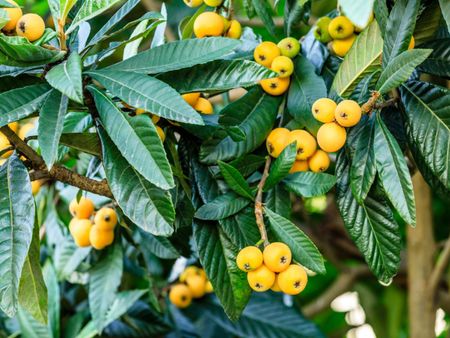As a loquat lover, you may have noticed that you can’t just walk into your local supermarket and pick up a basket of these sweet, tangy fruits. Loquats are rarely, if ever, sold commercially. This leaves loquat fans wondering – why are loquats not sold in stores? There are a few key reasons why these delightful fruits haven’t made it to the produce aisle.
The Delicate Nature of Loquats
The main factor keeping loquats out of grocery stores is their very delicate nature. Loquats have thin, fragile skin that bruises extremely easily. Just picking loquats off the tree requires a gentle touch to avoid damaging them. Once bruised the fruits decay rapidly.
This fragility makes loquats a poor candidate for transport to distant markets. They simply wouldn’t survive the rough truck rides drops, and knocks of commercial shipping. A single bruise would trigger a wave of decay ruining an entire batch.
Supermarkets need produce that can endure long-distance travel without spoiling. Fruits like apples and oranges have thicker, more rugged skin that is less prone to bruising during transport. This allows them to arrive at stores ready for customers to buy in good condition. Loquats on the other hand, would degrade into mush before making it to store shelves.
Short Shelf Life
Even if loquats could somehow avoid bruising during shipping, they still wouldn’t last long enough in stores to sell. Loquats have an extremely short shelf life compared to other fruits.
Their delicate flesh starts deteriorating quickly after picking. Kept refrigerated, loquats may last 5 days at best before molding and rotting. Other fruits like citrus can stay fresh in storage for weeks or months.
From a business view, it doesn’t make financial sense for stores to stock a product with such brief freshness. The cost of transporting the loquats combined with the waste from rapid spoilage would exceed any profits. Shoppers would be frustrated to constantly find mushy, spoiled loquats for sale.
Difficult To Grow Commercially
There are also some practical difficulties with cultivating loquats commercially on the scale needed to supply grocery chains. Loquats thrive best in subtropical climates. Attempting large orchards in less ideal environments poses extra challenges.
Loquat trees also have irregular cropping patterns. They tend to produce heavy yields only in alternate years. This unpredictable output would make it tough for growers to reliably supply fresh loquats year after year to meet market demand.
Processing loquats into jams, juices, or other goods could potentially address some of these problems. But there just isn’t sufficient consumer demand for loquat products to justify major commercial processing.
Best Suited For Local Consumption
Given the obstacles to wide distribution, loquats are best matched for small-scale, local consumption. Home gardeners who have their own trees can enjoy the harvest fresh off the branch. The short trip from tree to table prevents bruising or spoilage.
Purchasing loquats from neighborhood farmers markets is another solid option. Farmers can carefully pick the ripe fruits and quickly transport them to sell directly to community members. This eliminates the need for long supply chains.
Connecting with fellow loquat enthusiasts in your area is also a great way to find local loquat bounty. Chat with neighbors, gardening clubs, or community networks to locate nearby loquat trees. Most people are happy to share extras from their backyard orchards.
Enjoy Loquats When You Can
While loquats may not be readily found in supermarkets, their scarcity makes stumbling upon them feel like an extra special seasonal treat. Their sweet, tangy flavor is worth seeking out from local sources during their springtime peak.
Part of the fun is going on a loquat hunt – scanning your neighborhood, talking to green-thumbed locals, and scouting roadside loquat trees. This treasure hunt to track down the delicate fruits makes finally eating loquats even more satisfying.
Rather than lament their commercial absence, embrace loquats for the fleeting seasonal gems they are. Savor them fully when you can source them locally and at the height of ripeness. Let their temporary availability make finding loquats a sweet, rare joy to cherish.
So next time you’re craving loquats, don’t head to the grocery store. Instead, tap into your community’s backyard bounty and enjoy these special fruits when you can obtain them fresh. The effort makes the payoff of sweet, juicy loquats even sweeter.

An easy way around this blogClick on a grey tab above and you will see a list of blog posts related to that subject!
Do you have a pest in your food garden, but you are not sure what it is, or you dont know what to do about it? Here is to-the-point in…
How to Store Loquat
FAQ
Why don’t stores sell loquats?
Because loquat flesh discolors shortly after being picked, you won’t find them on most grocery shelves.
What are the side effects of loquat fruit?
Loquat fruit side effects
Loquats may cause allergic reactions. Reactions may be mild, but in severe cases, such allergies can cause anaphylaxis, a reaction in which you might have trouble breathing. Do not swallow the large brown seeds in loquat fruits.
Why are loquats so expensive?
Loquats are labor-intensive to grow, pick and pack; they’re subject to blights, birds and bats.
Are loquats laxative?
Loquat is rich in pectin, which is a type of soluble fiber that hydrates and adds bulk to the stool. This can help to promote easier bowel movements and combat constipation.
